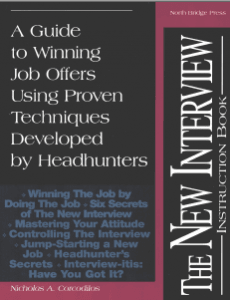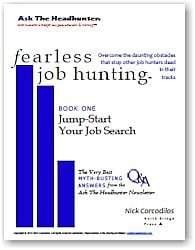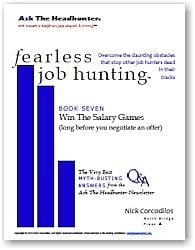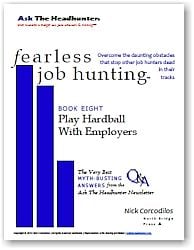In the July 21, 2015 Ask The Headhunter Newsletter, a reader is in a pickle — er, start-up — without a salary, and without protection on the upside or the downside.
Question
Your advice in the newsletters is brilliant. However, I haven’t seen you say much about start-ups. I’m in my 50s and enjoy the chaos of a new company. I have been doing it for nine months, and I love it. I am not getting paid, or receiving any benefits. The company has been getting exposure, and a few small projects, but no investment backing. That means no money. The CEO continues to tell the development team, the editors, and writers that “we are so close.”
She also mentioned they are moving to Silicon Valley, but will be using distributed-teams software to push more projects out.
The problem is that my budget and time are expanding. I am worried that my “job” will be lost by their move. I have only a handful of e-mails outlining the stock certificates, with promises of full-time employment when investors come through. However, I have nothing legal or tangible to suggest they are serious.
I’m ready to quit, but need some guidance. How do I approach her about my concerns without questioning her integrity? Should I suggest several options that have some legal teeth that protect me? So far I have all the risk while she continues to pump out projects. Thanks!
Nick’s Reply
There are two good reasons to work at a start-up:
Why work for a start-up?
One, you’re an owner with ironclad shares that cannot be diluted without your approval. If the company takes off, you’ll get your reward. If it doesn’t, you at least had a deal that protected your upside.
Two, you’re an employee being paid a fair (if not good) salary, and you’re expected to work hard over and above anything resembling “reasonable” — because you have some shares and stock options as a reward if the business takes off. Your salary protects your downside.
If you’re working at a start-up under other circumstances, I’m sorry to tell you that you’re probably a chump — unless you’re independently wealthy and love that kind of work.
I’ve got two rules for working at start-up companies.
Rule #1: Don’t get screwed
I love start-ups. Been there, done that, had great experiences… except the time I got screwed because I had nothing in writing. When the founder decided to bring in other investors, my 250,000 shares were instantly diluted down to virtually nothing. (See Start-Up Stock: What’s it “sort of” worth?) The first rule when joining a start-up is don’t get screwed. Invest in legal and accounting advice to protect your up- and downside.
Let’s discuss how to handle your boss. You’re being naively nervous about offending a founder that you’re giving free work to. It’s time to make it legal.
I’d sit her down without any apologies and without hesitation in your voice.
How to Say It
“I’m excited about what we’re doing and I love the work. However, this is a business proposition — I’m working for free for equity and the promise of a full-time job. I think it’s time we put this in writing for our mutual protection.”
If she indicates any problem with that, then I think you’re being taken for a ride, and that you’ll be summarily dumped by the side of the road. She should be apologizing to you and extending every courtesy — you’ve been working for free with no written assurance of any reward!
You might want to talk with other “employees” to see how they feel — and to find out whether they have contracts. You all need them. You may want to speak with her as a group. But in my opinion this has already gone too far. You’d be pretty upset if she took advantage of all of you at this point — so don’t fret about having this discussion.
Rule #2: Don’t get screwed
Before you do that, I’d talk with an attorney. (See Employment Contracts: Everyone needs promise protection.) Equity deals and contracts with start-ups are complicated and fraught with risk. If it’s not worth the legal fee, then how can the promise of this job be worth anything? Please take this seriously.
The other issue is that if and when investors come in, your boss will have very little to say about your equity share. Investors don’t like seeing their shares diluted. You could wind up with very little, if anything, if you don’t have a solid contract now — and the right kind of shares.
I don’t mean to scare you, but I’ve seen this again and again. Even a well-intentioned founder can wind up hurting the team that poured its blood and sweat into the business. Working with no contract is totally imprudent and un-businesslike. I’d get to it asap. Did I caution you not to get screwed?
Don’t forget about IP (Intellectual Property) rights. Have you signed an NDA or NCA? Have you signed over any IP rights to anything you’ve developed? Your boss could be screwed, too, without these. It’s another reason you need a good employment lawyer.
Get compensated
My philosophy is, get value for value. Your work is valuable. Ask for salary, and ask for equity. I don’t think suggesting “several options that have some legal teeth” will help you unless you talk to a lawyer first. This is easy: Just tell her it’s time for a written, signed agreement — and stock certificates. Something tells me that’s when she’ll tell you you’re not part of the move — though I hope I’m wrong.
Before you quit, give your boss a chance to protect your investment in this business by compensating you fairly for the risk you’re taking. Get compensated. That’s not a rule; that’s good business. Do your best to prepare yourself in advance. These Ask The Headhunter PDF books will help you with your “boss”:
Fearless Job Hunting, Book 6: The Interview – Be The Profitable Hire. This works even when discussing salary with your current employer!
Fearless Job Hunting, Book 7: Win The Salary Games (long before you negotiate an offer), especially “The Pool-Man Strategy: How to ask for more money,” pp. 13-15. Sometimes it helps to ask casually!
Fearless Job Hunting, Book 8: Play Hardball With Employers, especially “Due Diligence: Don’t take a job without it,” pp. 23-25. This is a must when considering a job at a start-up, though this section applies to established companies, too.
Fearless Job Hunting, Book 9: Be The Master of Job Offers, especially “Non-Compete: Did I really agree to that?”, pp. 5-7.
 There’s a lot more to start-ups, of course. (See Ben Slick’s excellent article, Evaluate a Start-Up Job Opportunity Like a Venture Capitalist.) If something I’ve said is helpful, I’m glad. I’d love to know what you decide to do and what comes of this. Thanks for your kind words about Ask The Headhunter!
There’s a lot more to start-ups, of course. (See Ben Slick’s excellent article, Evaluate a Start-Up Job Opportunity Like a Venture Capitalist.) If something I’ve said is helpful, I’m glad. I’d love to know what you decide to do and what comes of this. Thanks for your kind words about Ask The Headhunter!
For those considering the excitement of working at a start-up, if it’s what you really want to do, don’t be dissuaded by risk. As this reader points out, it can be an exciting experience. Just follow my two simple rules, and make sure you protect yourself on both the upside and the downside. I hope you get rich, but don’t end up losing your shirt.
(If you’re thinking about making the leap to starting your own start-up, learn more about Trading Your Job For Venture Funding.)
Have you ever worked for a start-up? How did it turn out? Did you protect yourself? (Did you get rich?) How would you advise this reader?
: :



















